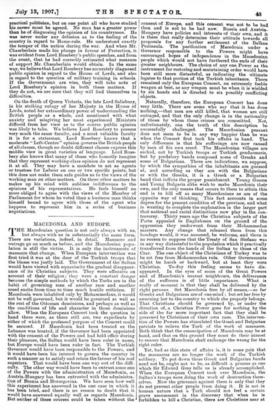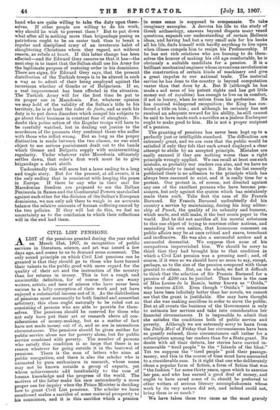MACEDONIA AND EUROPE.
THE Macedonian question is not °illy always with us, but always with us in substantially the same form. There are variations, indeed, in detail. Massacre and outrage go on much as before, and the Macedonian popu- lation is still the victim. It is only the instruments of massacre that change. When European intervention was first tried. it was at the door of the Turkish troops that the blame was justly laid. The Government of the Sultan would. have viewed with equanimity the gradual disappear- ance of its Christian subjects. They were offensive on account of their religion ; they were a constant danger because the simple methods by which the Turks are in the habit of governing men of another race and another creed excite from time to time much hostile criticism. If Macedonia were inhabited only by Mohammedans, it would not be well governed, but it would be governed. as well as the rest of the Ottoman dominions, and perhaps as well as the conditions of life and character in those dominions allow. When the European Concert took the question in hand there were, as there still are, two expedients by either of which the professed purpose of the Concert could be secured. If Macedonia had been treated as the Lebanon was treated, if the Governor had been appointed with the consent of the Powers and had held office during their pleasure, the Sultan would have been ruler in name, but Europe would have been ruler in fact. The Turkish Governor would have been responsible to the Powers, and it would have been his interest to govern the country in such a manner as to satisfy and retain the favour of his real superiors. That would, have been one way out of the diffi- culty. The other way would. have been to entrust some one of the Powers with the administration of Macedonia, as Austria-Hungary has been entrusted with the administra- tion of Bosnia and Herzegovina. We have seen how well this experiment has answered in the one case in which it has been tried, and there is no reason to doubt that it would have answered equally well as regards Macedonia. But neither of these courses could be taken without the consent of Europe, and this consent was not to be had then and is not to be had now. Russia and Austria- Hungary have policies and interests of their own, and it is these that really determine their attitude towards au proposals for any further settlement of the Balkan Peninsula. The pacification of Macedonia under a Governor responsible to the Powers might have encouraged hopes of independence in the Macedonian people which would not have furthered the ends of their greater neighbours. The choice of any one Power as the instrument for restoring and maintaining order would have been still more distasteful, as indicating the ultimate legatee to that portion of the Turkish inheritance. There remained only the European Concert, an extremely feeble weapon at best, as any weapon must be when it is wielded by six hands and is directed to six possibly conflicting objects.
Naturally, therefore, the European Concert has don(' very little. There are some who say that it has done nothing,—that men are still killed, that women are still outraged, and that the only change is in the nationality of those by whom these crimes are committed. Nor, unfortunately, can the truth of this description be successfully challenged. The Macedonian peasant does not seem to be in any way happier than he was when the Concert first took his affairs in hand. The only difference is that his sufferings are now caused by men of his own creed. The Macedonian villages are sacked, not by Turkish troops or Turkish gendarmerie, but by predatory bands composed some of Greeks and some of Bulgarians. There are indications, we suppose, by which the sympathies of the inhabitants are guessed at, and according as they are with the Bulgarians or with the Greeks, it is a Greek or a Bulgarian band that inflicts the proper punishment. Young Greece and Young Bulgaria alike wish to make Macedonia their own, and the only means that occurs to them to attain this end is to kill off as many Macedonians as are of the opposite way of thinking. This fact accounts in some degree for the present condition of the province, and what is wanting to complete the explanation is the larger part that national and racial distinctions now play in the con- troversy. Thirty years ago the Christian subjects of the Porte appealed to Englishmen on the ground. of the oppression they underwent from their Mohammedan masters. Any change that released them from this bondage would, it was assumed, be welcome, and there is no reason to suppose that the Treaty of San Stefano was in any way distasteful to the population which it practically transferred from the hands of the Sultan to those of the Czar. The one object of the Christians of Turkey was to be set free from Mohammedan rule. Other Governments might be harsh or backward, but at least they were Christian. To-day this feeling seems to have dis- appeared. In the eyes of some of the Great Powers and of Macedonia's nearest neighbours, the deliverance of the sufferers is of little importance. What is really of moment is that they shall be delivered. by the right persons. Set Macedonia free by all means,—so far Greeks and Bulgarians are of one mind ; but set her free by annexing her to the country to which she properly belongs. That Christians should. be governed by, or under the direction of, a Christian Power goes for nothing by the side of the far more important fact that they shall be governed by Christians of their own race. The interven- tion of the Powers has stimulated the Greek and Bulgarian patriots to relieve the Turk of the work of massacre. Both think that the emancipation of Macedonia may be at band, and that on this ground they must do their utmost to ensure that Macedonia shall exchange the wrong for the right ruler.
Yet, bad as this state of affairs is, it is some gain that the massacres are no longer the work of the Turkish soldiery. To put down these Greek and Bulgarian bands need not be, ought not to be, as difficult a process as one which Sir Edward Grey tells us is already accomplished. When the European Concert took over Macedonia, the Sultan's troops were doing the work of destruction them- selves. Now the grievance against them is only that they do not prevent other people from doing it. It is not in human nature that a Turk should not feel a certain grave amusement in the discovery that when he is forbidden to kill a Christian, there are Christians near at hand who are quite willing to take the duty upon them- selves. If other people are willing to do his work, why should ho wish to prevent them ? But to put down what after all is nothing more than brigandage posing as patriotism ought to be an easier task than to break a regular and disciplined army of an inveterate habit of slaughtering Christians whom they regard, not without reason, as rebels at heart. If this latter change has been effected—and Sir Edward Grey assures us that it has—the next step is to insist that the Sultan shall use his Army for the legitimate purpose of restoring order in his dominions. There are signs, Sir Edward Grey says, that the present distribution of the Turkish troops is to be altered in such a way as to admit of their being employed against the incursions whether of Greeks or of Bulgarians. If so, a real improvement has been effected in the situation. The Turkish Army will for the first time be put to its proper use in Macedonia. For, whatever opinion we may hold of the validity of the Sultan's title to his territory, he is at least the ruler de facto, and as such his duty is to put down disorders which compel his subjects to go about their business in constant fear of slaughter. No doubt this police action of the Regular trcops will have to be carefully watched, lest in dealing out justice to the murderers of the peasants they confound those who suffer with those who inflict wrong. But so long as the proper distinction is made between the two classes, no one need object to see serious punishment dealt out to the bands which Greece and Bulgaria supply with unintermitting regularity. Under whatever ruler Macedonia ultimately settles down, that ruler's first work must be to give brigandage a short shrift.
Undoubtedly this will seem but a lame ending to a long and tragic story. But for the present, at all events, it is the only ending that is consistent with keeping the peace in Europe. If there be any who in their zeal for Macedonian freedom are prepared to see the Balkan Peninsula in flames and the Continental Powers marshalled against each other for the division of the Sultan's European dominions, we can only ask them to weigh in an accurate balance the relative amounts of human suffering caused by the two policies. If they will but do this, we feel no uncertainty as to the conclusion to which their reflections will in the end lead them.







































 Previous page
Previous page